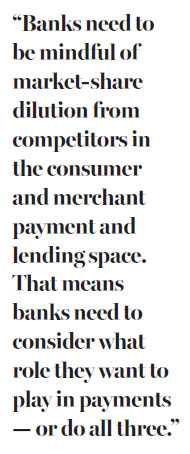Banks face up to China's fintech boom
Updated: 2016-05-06 06:56
By Albert Chan(China Daily Europe)
|
|||||||||
Traditional institutions need to consider what role they want to play in payments as the country becomes a global epicenter
Financial technology, or fintech, is getting very hot in Asia, thanks to China's leadership role.
The value of global fintech investment last year grew by 75 percent to $22.3 billion, driven by deal-flow across continental Europe and the Asia-Pacific, according to a new report by Accenture called FinTech and the Evolving Landscape.

The main engine of this growth is China, which had the biggest share of investment, accounting for 45 percent in 2015. Across Asia-Pacific, fintech investment more than quadrupled to $4.3 billion.
More important, fintech investment is continuing apace. Last month, Ant Financial, the Alibaba affiliate that runs Alipay, announced it had completed Series B fundraising of $4.5 billion. That is nearly double all of the fundraising that took place in Asia-Pacific in the first three months of the year.
That is significant given that, in the first quarter of 2016, Asia-Pacific investments increased by 517 percent compared with the same period last year - $445 million to $2.7 billion - and this too was driven almost entirely by Chinese fintech investments. In fact, fintech companies in Asia-Pacific received more than 50 percent of all investment in the first quarter.
That shouldn't surprise anyone who has been watching the financial services space in China. Consider some of the bigger deals that have taken place this year. In January, China's lu.com, a peer-to-peer lender and broker, raised $1.21 billion. China's second-largest e-commerce company, JD.com, raised $1 billion in new funding for its consumer finance subsidiary, JD Finance.

These two deals alone have helped make Asia-Pacific the second-biggest region for fintech investment after North America, accounting for 19 percent of global financing activity, up from just 6 percent in 2010.
But there have been other smaller deals, too. In January, peer-to-peer lending startup Duanrong said it had completed 390 million yuan ($59 million; 53 million euros) in fundraising. And in the same month, Beijing-based qufenqi.com, an e-commerce startup providing installment-payment services to young Chinese consumers, said it had completed a new round of financing in renminbi. That was on top of the fundraising it did in 2015.
You may notice a trend here. Payment is the most popular segment for fintech deals in Asia-Pacific, accounting for 38 percent of the total. Consider our lifestyles in China - we are increasingly moving to a cashless society and looking for new and more efficient ways to make payments.
What does this mean for banks in China?

Banks need to be mindful of market-share dilution from competitors in the consumer and merchant payment and lending space. That means banks need to consider what role they want to play in payments - or do all three.
For many financial institutions, investing in startups may be a smart approach: it silos the business with the startup, but gives the might and muscle of an established bank as a participant. From a startup's perspective, it may be better to make friends with the big players than try to compete. According to Accenture's research, last year, the level of investment in fintech companies wishing to collaborate with the industry increased by 138 percent, now representing 44 percent of all fintech investment. Investment in fintech companies looking to compete only increased by 23 percent.
Several banks have chosen to mentor startups. Accenture hosts an accelerator lab in Hong Kong that has 20 banks - including China CITIC Bank International and China Construction Bank (Asia) - participating in it. Known as the FinTech Innovation Lab Asia-Pacific, it is a 12-week program that helps growth-stage fintech companies accelerate their product and business development.
The value of an accelerator program is it gives startups access to bank executives to learn what the banks need and think can be realistically implemented. But it also gives bank executives access to some of the most cutting-edge ideas.
Other banks are building their own platforms, hoping to leverage their pre-existing brand loyalty and better serve their customers. HSBC has said it is focusing on growing and enhancing its distribution in the Pearl River Delta through significant investment in its digital platform and mobile sales force, as it works to generate $1 billion of profit before tax from the delta area in the medium term. The bank said last year that this would be 10 times its current pretax profit from the region.
Fintech - whether it's from big existing banks, startups, or a combination of the two - is gaining ground in China. While the amounts of money may seem staggering, the aim is literally to simplify financial services, making it more straightforward and easier for customers to use.
The author leads Accenture's financial services practice in China. The views do not necessarily reflect those of China Daily.
Today's Top News
Inspectors to cover all of military
Britons embrace 'Super Thursday' elections
Campaign spreads Chinese cooking in the UK
Trump to aim all guns at Hillary Clinton
Labour set to take London after bitter campaign
Labour candidate favourite for London mayor
Fossil footprints bring dinosaurs to life
Buffett optimistic on China's economic transition
Hot Topics
Lunar probe , China growth forecasts, Emission rules get tougher, China seen through 'colored lens', International board,
Editor's Picks

|

|

|

|

|

|







